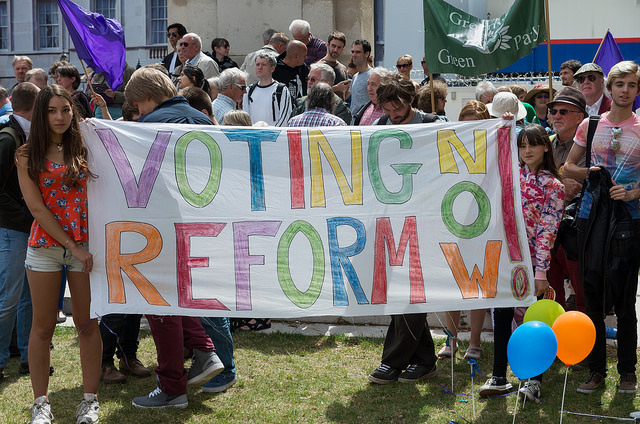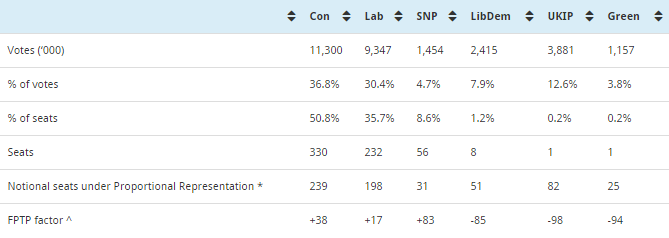Labour must make an electoral reform pact to win in 2020
Nat le Roux argues that a one-off electoral reform pact between Labour and some or all of the minor parties in 2020, with a common manifesto commitment to introduce a new voting system, would likely result in a broad-left coalition government. Otherwise Labour may spend a generation in opposition.

Credit: RonF/The Weekly Bull CC BY-NC-ND 2.0
The political commentariat comprehensively failed to predict either the Conservative victory in the May general election or the emergence of Jeremy Corbyn as the eventual victor of the Labour leadership contest. Following a perhaps inappropriately brief period of reflection, the mainstream media have lighted on a consensus interpretation of these events which many in the Parliamentary Labour Party apparently share. Two soundbites of received wisdom now seem to frame most conversations about the result of the general election and the future of the party. They can be summarised succinctly:
‘Labour lost the 2015 general election because it lost the argument with the Conservatives on the economy’
‘Labour is unelectable in 2020 with Jeremy Corbyn as leader’ (and is thus by implication electable under a different leader)
The myth of defeat in 2015
Yet an analysis of the electoral arithmetic provides very limited support for either proposition. It is clear that many swing voters in May distrusted Labour on economic policy and were unconvinced that Ed Miliband was a credible Prime Ministerial candidate. It is also very likely that, as the campaign progressed, significant numbers of undecided voters were spooked by the possibility of minority Labour government sustained by SNP support. However, while these issues may have cost Labour some marginal seats in England, they are not a credible explanation for the Conservatives’ unexpected outright majority.
Contrary to widespread belief, Labour’s share of the UK popular vote increased by 1.4 percentage points between the 2010 and 2015 general elections (from 29 to 30.4 per cent), despite the collapse of Labour support in Scotland. The Conservatives’ share of the popular vote increased by only 0.8 percentage points (from 36.1 to 36.9 per cent).
Labour lost a net 24 seats in May: 40 seats were lost to the SNP, 12 seats were won from the Liberal Democrats and a net 2 seats won from the Conservatives. The Conservatives gained a net 28 seats, 27 of them from the Liberal Democrats. If the SNP had won no additional seats and the Liberal Democrats had held their seats, the balance between the two major parties would have been almost unchanged from 2010.
The surprise result of the 2015 general election is almost entirely explained by the collapse of the Liberal Democrats and the triumph of the SNP in Scotland, which was mainly at Labour’s expense. The policy debate between the two main parties – in reality fought on very narrow ground – had only a weak influence on the outcome.
The chimera of victory in 2020
As things stand, it seems very likely that the SNP will again win nearly all the Scottish seats in 2020. If so, Labour would need – with the current constituency boundaries – to win around 90 additional seats in England and Wales to achieve an outright majority. The Liberal Democrats have only 7 seats left to lose, so most of these would have to be taken from Conservative incumbents, which would require an extraordinary swing. However the hill that Labour will actually need to climb in 2020 is steeper still.
In 2018, constituency boundaries will be redrawn in accordance with the provisions of the Parliamentary Voting System and Constituencies Act 2011. The total number of seats will be reduced from 650 to 600 and the new boundaries will be drawn so as to equalise the number of registered voters in each constituency within narrow margins. These calculations will be performed using, for the first time, electoral rolls which are the product of Individual Electoral Registration. As Lewis Baston has demonstrated, these changes will almost certainly work to Labour’s electoral disadvantage, to a material but currently unquantifiable extent. The cut in the number of parliamentary seats will fall disproportionately on urban constituencies in England and Wales – Labour’s heartland – while Individual Electoral Registration will aggravate the social bias of the electoral registers.
The future is of course unknown. It is possible that the Conservatives will split over Europe and go into the 2020 election as two separate parties. It is even possible that – Individual Electoral Registration notwithstanding – citizens who do not normally vote, and those eligible to vote for the first time, will turn out for Labour in sufficient numbers to swing the result. However these scenarios are at the extreme outer edges of probability, and, in the absence of some extraordinary event, Labour will almost certainly once again win significantly fewer seats than the Conservatives in 2020, whatever the party’s economic policies and whoever is leader. An outright majority seems entirely beyond reach.
The voting system and the result of the 2015 election
In the era of two-party politics, the first past the post (FPTP) voting system, while unfair to smaller parties, could be defended on the grounds that it produced strong single-party governments. In the new era of multi-party politics, FPTP generates outcomes which seem merely perverse to many voters. At the same time, as Vernon Bogdanor has shown, the system increasingly tends to exaggerate geographical political differences, most obviously in the 2015 general election by over-representing Scottish support for the SNP. The table below shows how the share of the national vote achieved by the six major parties in 2015 translated into parliamentary seats.
2015 General Election
In the table, Notional seats under Proportional Representation shows the number of seats each party would hold in the current parliament if the allotment of seats were directly proportionate to the percentage of votes won. These numbers assume a single UK constituency and thus do not represent the seats which parties might win under any likely actual proportional representation voting system. Additionally, voter behaviour would be likely to change under proportional representation in unpredictable ways.
FPTP factor quantifies – in a rough-and ready way – the relative advantage or disadvantage each of parties enjoys under FPTP by measuring the difference between percentage of votes won and percentage of seats won in May 2015. This analysis is capable of significant refinement but nonetheless clearly illustrates the strongly distortive effect of a FPTP voting system in a multi-party environment.
Options for Labour
For fifty years, FPTP operated to the advantage of Labour and the Conservatives in roughly equal measure, and to the obvious disadvantage of the Liberal Democrats and their predecessors. Proportional representation was mainly a Liberal cause: successive Labour leaderships, whatever their private intellectual misgivings, had a very strong interest in maintaining the current voting system.
While FPTP continued to operate to Labour’s advantage in the 2015 election, the analysis above suggests that the effect was significantly weaker than in the past, mainly because the party lost its dominant position in Scotland. FPTP continued to operate strongly to the Conservatives’ advantage in 2015, and especially strongly to the advantage of the SNP following their dramatic electoral breakthrough.
Until 2015, electoral defeat never led Labour seriously to question the electoral system, because future victories under the same system always seemed possible. If an outright Labour majority is now thought to be unachievable under any likely circumstances, many in the party may begin to challenge that logic. If the only foreseeable future government of the left is a Labour-led coalition, the argument which has sustained the party’s historic support for FPTP is fatally undermined.
What would follow if the Labour leadership were to conclude that a change to a different voting system – either Alternative Vote or some form of proportional representation – was now in the party’s interests? To state the obvious, Labour must win power under the existing electoral system before it can change it. It is not a battle Labour can win alone, but nor does it need to be won alone. The three ‘minor’ parties committed to electoral reform – Liberal Democrats, Greens and UKIP – won over 7 million votes in the 2015 election. A one-off electoral pact with some or all of these parties would likely result in a broad-left coalition government. The alternative for Labour may be a generation in opposition.
—
Note: This article gives the views of the author, and not the position of Democratic Audit, nor of the London School of Economics. It originally appeared on the LSE British Politics and Policy blog. Please read our comments policy before posting.
—
 Nat le Roux co-founded The Constitution Society in 2009. He spent most of his career in finance and was Chief Executive of IG Group plc between 2002 and 2006. He holds an MA in Law from Cambridge University and an MSc in Anthropology from University College London.
Nat le Roux co-founded The Constitution Society in 2009. He spent most of his career in finance and was Chief Executive of IG Group plc between 2002 and 2006. He holds an MA in Law from Cambridge University and an MSc in Anthropology from University College London.






 Democratic Audit's core funding is provided by the Joseph Rowntree Charitable Trust. Additional funding is provided by the London School of Economics.
Democratic Audit's core funding is provided by the Joseph Rowntree Charitable Trust. Additional funding is provided by the London School of Economics.
[…] correcting an existing bias must be fair mustn’t it? And it’s in that tradition that Nat Le Roux’s suggestion that Labour should form an anti-Tory electoral pact for 2020 is, like so many similar ideas before […]
Power to thecpeople?
https://t.co/Cli1diXfei
via @democraticaudit @InvolveUK
Um comentário que obriga a pensar e ajuda a pensar
Se avalio bem, André Freire ele tem razão. Curiosamente as… https://t.co/WeyJ9Avx3R
Labour must make an electoral reform pact to win in 2020 https://t.co/nt9xvNL9RH
Labour must make an electoral reform pact to win in 2020 https://t.co/hHzcBmGXYL
Indeed voters already made clear their views on electoral reform in the defeated 2011 AV referendum
Utter rubbish, Labour did quite well in the Blair years under FPTP when they had an electable leader, now it has a poor leader the system will punish it, trying to introduce electoral reform will not help it sneak through the back door, indeed on present polling a Tory-UKIP deal would be just as likely as a Labour-LD-SNP-Green one! When it gets a credible leader and credible policies then voters may start listening again
Labour must make an electoral reform pact to win in 2020 https://t.co/JMsMfjQ925
@democraticaudit I suggested something rather similar back in July https://t.co/8TyOjSwWqV
Interesting to read @Con_Soc’s Nat le Roux’s take on how Labour must make an electoral reform pact to win in 2020: https://t.co/FNfkwbHiUd
Labour must make an electoral reform pact to win in 2020 https://t.co/pbFxfRdUMo
Did Corbyn respond when I put this 2 him? Did he hell – Ignorant
Lab must make electoral reform pact to win in 2020 https://t.co/VMKaLKgpMJ
Great article and analysis. As well as the UK wide position, there is now a massive incentive for Scottish Labour to support PR. Quite apart from the fact that it has always been the right and democratic thing to do….
Labour must make an electoral reform pact to win in 2020 https://t.co/G6Yr8aDnWw
But as the Liberals have learnt – going into coalition under an unstable voting system can lead to annihilation.
The Liberal Democrats, Greens and UKIP would be very wary of going into a pre-election (or post election) coalition with a Labour party that has suddenly seen the light on electoral reform. What would they do? Offer another referendum on AV – and allow their unreformed members to campaign with the Tories for a “No” vote?
Readers of this blog may think they understand the reasons for electoral reform – but all we tend to have different reasons – so what hope that the disaffected would “see the light” and (i) vote for a “rigged” coalition and (ii) vote yes in another referendum for AV?
Reasons for reform:
– proportionality (fairness): AV does not do this it forces a binary decision at constituency level squeezing out diversity.
– “true mandates”: almost any system is better than FPTP at constituency level – but few systems offer a true parliamentary mandate “to be governed” across the country.
– a parliament representative of the diversity of opinion in the country: AV does not do this
– breaking the power of the parties and giving the electorate a genuine choice between candidates: list systems do not do this
I cannot see AV leading to the sort of reform needed – so did not even vote in the last referendum.
Lists systems (like in GB Euro) entrench power in the hands of the party selectorates – so candidates toady to them rather than seeking the support of voters. I am not inspired to campaign for a list system.
STV (preference voting in multi-member constituencies to ensure voter choice between candidates and representation of diversity of opinion) whilst easy for voters who have it and are used to it (i.e. Irish Republic) is too complicated to explain to our switched off electorate and any referendum on STV will be lost for at least a generation.
So we have to watch whilst the situation gets worse and keep hammering at the problems with the current system:
24% voter support gives 50%+ majority in commons
Unexpected Random results
The corrupting effect of current candidate selections
Lack of Accountability to the electorate (not the selectorate)
Boundary changes breaking the “constituency link” between MPs and “natural communities” (My seat is due to absorb a few wards from a different county – to make up numbers!)
Inability to make change (my seat has been Con since 1924)
“Safe Seats”
“Rotten boroughs”
“Wasted votes”
Fear of “splitting the vote” stifling dissent (i.e. non orthodox views – orthodox being defined by the parties)
Meanwhile we have to become less tribal and either hope that the parties become less tribal (unlikely) or that the situation becomes so bad that …
What?
We start to see the widespread withdrawal of the “consent to be governed” and across the parties they see the need for comprehensive reform and that those in charge decide that STV is the most effective way to retain or regain widespread consent to be governed and campaign for it. (Again unlikely)
I stand a better chance of reform by selling up and moving to the Irish Republic (or possibly Scotland when the Scots realise that they have an easier way to get reform).
Labour must make an electoral reform pact to win in 2020 https://t.co/IyhTFqgoPm
Labour must make an electoral reform pact to win in 2020
https://t.co/bLwU3iiuAF
Labour must make an electoral reform pact to win in 2020 https://t.co/WdWJ3lL8DV https://t.co/SDntFMMhDG
@democraticaudit A really good article. I think Labour support for #electoralreform would be a massive boost for the cause.